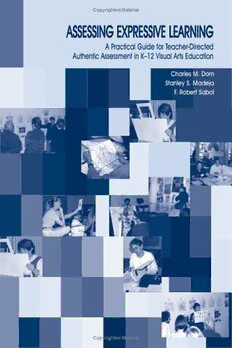Download Assessing Expressive Learning: A Practical Guide for Teacher-Directed Authentic Assessment in K-12 Visual Arts Education PDF Free - Full Version
Download Assessing Expressive Learning: A Practical Guide for Teacher-Directed Authentic Assessment in K-12 Visual Arts Education by Charles M. Dorn, Stanley S. Madeja, F. Robert Sabol, Robert Sabol in PDF format completely FREE. No registration required, no payment needed. Get instant access to this valuable resource on PDFdrive.to!
About Assessing Expressive Learning: A Practical Guide for Teacher-Directed Authentic Assessment in K-12 Visual Arts Education
Assessing Expressive Learning is the only book in the art education field to date to propose and support a research-supported teacher-directed authentic assessment model for evaluating K-12 studio art, and to offer practical information on how to implement the model. This practical text for developing visual arts assessment for grades 1-12 is based on and supported by the results of a year-long research effort primarily sponsored by the National Endowment for the Arts, involving 70 art teachers and 1,500 students in 12 school districts in Florida, Indiana, and Illinois. The purpose of the study was to demonstrate that creative artwork by K-12 students can be empirically assessed using quantitative measures that are consistent with the philosophical assumptions of authentic learning and with the means and ends of art, and that these measures can reliably assess student art growth. A further goal was to provide a rationale for the assessment of student art as an essential part of the K-12 instructional program and to encourage art teachers to take responsibility for and assume a leadership role in the assessment of art learning in the school and the school district. Assessing Expressive Learning: *reports on current assessment methods but also stresses a time-tested portfolio assessment process that can be used or adapted for use in any K-12 art classroom; *includes the assessment instruments used in the study and several case studies of art teachers using electronic portfolios of student work, a bibliography of major art assessment efforts, and a critical review of current methods; *is designed to be teacher- and system-friendly, unlike many other art assessment publications that provide only a review of information on assessment; and *both documents an experiment where artistic values and aesthetic issues were considered paramount in the education of K-12 students in the visual arts, and also serves as a guide for the conduct of similar experiments by art teachers in the nation's schools--the research methodology and results are reported in an appendix in a format that will enable educational researchers to duplicate the study. This volume is ideal as a text for upper-division undergraduate and graduate classes in visual arts education assessment, and highly relevant for college art education professors, researchers, and school district personnel involved in the education and supervision of art teachers, and researchers interested in performance measurement.
Detailed Information
| Author: | Charles M. Dorn, Stanley S. Madeja, F. Robert Sabol, Robert Sabol |
|---|---|
| Publication Year: | 2003 |
| ISBN: | 805845240 |
| Pages: | 203 |
| Language: | English |
| File Size: | 4.301 |
| Format: | |
| Price: | FREE |
Safe & Secure Download - No registration required
Why Choose PDFdrive for Your Free Assessing Expressive Learning: A Practical Guide for Teacher-Directed Authentic Assessment in K-12 Visual Arts Education Download?
- 100% Free: No hidden fees or subscriptions required for one book every day.
- No Registration: Immediate access is available without creating accounts for one book every day.
- Safe and Secure: Clean downloads without malware or viruses
- Multiple Formats: PDF, MOBI, Mpub,... optimized for all devices
- Educational Resource: Supporting knowledge sharing and learning
Frequently Asked Questions
Is it really free to download Assessing Expressive Learning: A Practical Guide for Teacher-Directed Authentic Assessment in K-12 Visual Arts Education PDF?
Yes, on https://PDFdrive.to you can download Assessing Expressive Learning: A Practical Guide for Teacher-Directed Authentic Assessment in K-12 Visual Arts Education by Charles M. Dorn, Stanley S. Madeja, F. Robert Sabol, Robert Sabol completely free. We don't require any payment, subscription, or registration to access this PDF file. For 3 books every day.
How can I read Assessing Expressive Learning: A Practical Guide for Teacher-Directed Authentic Assessment in K-12 Visual Arts Education on my mobile device?
After downloading Assessing Expressive Learning: A Practical Guide for Teacher-Directed Authentic Assessment in K-12 Visual Arts Education PDF, you can open it with any PDF reader app on your phone or tablet. We recommend using Adobe Acrobat Reader, Apple Books, or Google Play Books for the best reading experience.
Is this the full version of Assessing Expressive Learning: A Practical Guide for Teacher-Directed Authentic Assessment in K-12 Visual Arts Education?
Yes, this is the complete PDF version of Assessing Expressive Learning: A Practical Guide for Teacher-Directed Authentic Assessment in K-12 Visual Arts Education by Charles M. Dorn, Stanley S. Madeja, F. Robert Sabol, Robert Sabol. You will be able to read the entire content as in the printed version without missing any pages.
Is it legal to download Assessing Expressive Learning: A Practical Guide for Teacher-Directed Authentic Assessment in K-12 Visual Arts Education PDF for free?
https://PDFdrive.to provides links to free educational resources available online. We do not store any files on our servers. Please be aware of copyright laws in your country before downloading.
The materials shared are intended for research, educational, and personal use in accordance with fair use principles.

